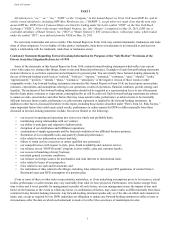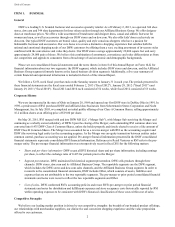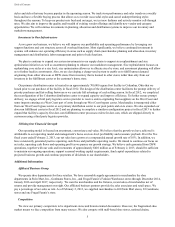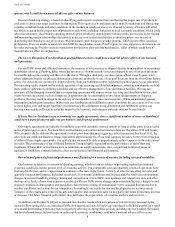DSW 2012 Annual Report Download - page 14
Download and view the complete annual report
Please find page 14 of the 2012 DSW annual report below. You can navigate through the pages in the report by either clicking on the pages listed below, or by using the keyword search tool below to find specific information within the annual report.11
facility is secured by a lien on substantially all of our and our subsidiaries’ personal property assets with certain exclusions and
may be used to provide funds for general corporate purposes, to provide for our ongoing working capital requirements and to
make permitted acquisitions. In addition, the secured revolving credit facility contains restrictive covenants relating to our
management and the operation of our business. These covenants, among other things, limit or restrict our ability to grant liens
on our assets, incur additional indebtedness, limit our capital expenditures to $125 million annually, enter into transactions with
affiliates and merge or consolidate with another entity. These covenants could restrict our operational flexibility, and any failure
to comply with these covenants or our payment obligations would limit our ability to borrow under the secured revolving credit
facility and, in certain circumstances, may allow the lenders thereunder to require repayment.
Uncertain economic conditions in the United States and other world events can adversely affect consumer confidence
and consumer spending habits.
Consumer spending habits, including spending for the footwear and related accessories that we sell, are affected by, among
other things, prevailing economic conditions, levels of employment, salaries and wage rates, prevailing interest rates, income
tax rates and policies, consumer confidence and consumer perception of economic conditions. In addition, consumer
purchasing patterns may be influenced by consumers’ disposable income. Consumer confidence is also affected by the domestic
and international political situation. The outbreak or escalation of war, natural disasters, or the occurrence of terrorist acts or
other hostilities in or affecting the United States, could lead to a decrease in spending by consumers. In an economic slowdown,
we could experience lower net sales than expected on a quarterly or annual basis and be forced to delay or slow our expansion
plans. Reduced net sales may result in reduced operating cash flows if we are not able to appropriately manage inventory levels
or leverage expenses. These negative economic conditions could have a material adverse effect on our business.
The investment of our cash and investments are subject to risks that could affect the liquidity of these investments.
As of February 2, 2013, we had cash and investments of approximately $410 million. A portion of these are held as cash in
operating accounts that are with third party financial institutions. While we regularly monitor the cash balances in our operating
accounts and when possible adjust the balances as appropriate to be within Federal Deposit Insurance Corporation (“FDIC”)
insurance limits, these cash balances could be lost or inaccessible if the underlying financial institutions fail or are subject to
other adverse conditions in the financial markets.
While we generally invest in lower risk investments, investment risk has been and may further be exacerbated by credit and
liquidity issues that have affected various sectors of the financial markets. As the financial markets have become more volatile,
it has been increasingly difficult to invest in highly rated, low risk investments. Our access to cash and investments, their
earning potential or our ability to invest in highly rated, low risk investments may be impacted by adverse conditions in the
U.S. financial markets. These market risks associated with our cash and investments could have a material adverse effect on our
business.
Our amended articles of incorporation, amended and restated code of regulations and Ohio state law contain provisions
that may have the effect of delaying or preventing a change in control of DSW. This could adversely affect the value of our
Common Shares.
Our amended articles of incorporation authorize our board of directors to issue up to 100,000,000 preferred shares and to
determine the powers, preferences, privileges, rights, including voting rights, qualifications, limitations and restrictions on
those shares, without any further vote or action by the shareholders. The rights of the holders of our Class A Common Shares
will be subject to, and may be adversely affected by, the rights of the holders of any preferred shares that may be issued in the
future. The issuance of preferred shares could have the effect of delaying, deterring or preventing a change in control and could
adversely affect the voting power of our Common Shares.
In addition, provisions of our amended articles of incorporation, amended and restated code of regulations and Ohio law,
together or separately, could discourage potential acquisition proposals, delay or prevent a change in control and limit the price
that certain investors might be willing to pay in the future for our Common Shares. Among other things, these provisions
establish a staggered board, require a supermajority vote to remove directors, and establish certain advance notice procedures
for nomination of candidates for election as directors and for shareholder proposals to be considered at shareholders’ meetings.
We do not expect a trading market for DSW Class B Common Shares to develop and therefore any investment in DSW
Class B Common Shares may be effectively illiquid, unless such DSW Class B Common Shares are converted into DSW
Class A Common Shares.
There is currently no public market for DSW Class B Common Shares. DSW does not intend to list the Class B Common
Table of Contents
























